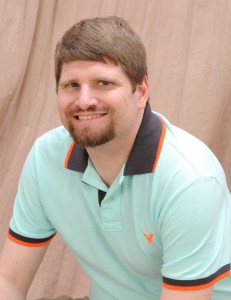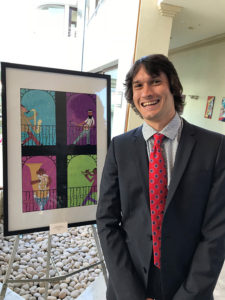“I’m often the first to hear alarms. I can differentiate sounds quickly and more easily. My sensitivity to touch helps with palpation during a nurse exam. I can feel if something is different or off.”
An interview with Ron Sandison
Like many women, Nurse Jackie Anne Blair was diagnosed with Asperger’s later in life at the age of 19.
“I was in my freshman year of college and struggling a bit. I was on my own in the middle of a huge transition and the dorms were a bit of a sensory struggle. For the most part, I would seclude myself when I became overwhelmed, but I had one meltdown in particular that made me go to the university’s mental health office. After a few months with the campus office I was referred out to a specialist that ultimately gave me my diagnosis.”
Jackie’s autism caused sensory issues and meltdowns.
“My biggest sensory issues are touch and sound. I’m not big into hugs or handshakes, and any surprise touches make me really anxious. As far as sound, while I don’t particularly like loud noises it’s not normally the volume that bothers me. Specific frequencies are a bigger issue. High pitched noises and objects scraping against each other are the worst.”
Jackie’s greatest challenge was learning to socialize and adjust to college life.
“University in general was a huge struggle. Dealing with the change of location and support system while struggling to connect with my peers was overwhelming. Once I received my diagnosis, I was able to reach out to other adults on the spectrum online and build support that I was lacking.”
While dating, Jackie experienced social awkward moments.
“When I began to date in college it was a little awkward. I remember one particular date with a young man who asked me about my interests and I started talking about my favorite football team. He loved that I liked sports until I word-vomited just about every statistic I knew about my favorite team. After a long time, I eventually noticed his face— impressed and exhausted from my information. I laughed nervously, ‘I’m guessing you didn’t want to go on a date with a sports almanac.’ Luckily, it broke the tension and he laughed back, but it never did quite make it further than that.”
Through trial and error and the encouragement of close friends, Jackie learned to interpret social clues.
“By upsetting a lot of people; I learned social clues. This used to be terrible for me. I knew I was saying things that bothered people but throughout my teenage and early adulthood, I couldn’t grasp why it was upsetting. I just couldn’t understand why when people asked questions, they didn’t really want the truth, or that there was more than one way to give truthful answers.”
Working with individuals with disabilities inspired Jackie to study nursing.
“I worked for several years as an aide for New York State Office for Persons with Developmental Disabilities in their long term care facilities. While in the beginning, being an aide was difficult, I fell in love with healthcare. And, I was good at it. An opportunity to go to nursing school through my union opened up and I decided to go for it.”
Jackie’s decision to attend nursing school was both exciting and terrifying.
“Working in my current capacity in healthcare was already overwhelming for me, I wondered if I could overcome the added stresses and responsibilities of being a nurse. How was I going to handle life or death situations? Would I be able to quiet the constant noise inside my head, or translate neurotypical behaviors quickly enough to function at the high-pace speed that is required by the profession? Despite all my insecurities about my obstacles, I decided to go for it. My work made me confident that I am a good caretaker, and having that foundation to build on made me a little more comfortable.”
Nursing school was extremely difficult for Jackie. She had twenty students in her class and attended clinicals five days a week for seven hours a day. Jackie decided she would not disclose her diagnosis with her peers or instructors.
In nursing school, Jackie developed perseverance and compassion.
“The toughest part of college was my classmates. I was not well liked. I used a lot of my social energy on my patients in nursing school and even more energy masking my autism quirks while interacting with my classmates. I was weird, I asked a lot of questions. It was hard being around a classroom of people that you knew were going to have to be compassionate caregivers when they couldn’t handle being nice to those learning alongside them.”
Jackie’s secret to interacting with co-workers is earning their respective through hard work and job performance.
“Interacting with peers has always been a big challenge for me. I’m a little too blunt, or I’m too quiet, and I’m definitely weird. I’ve mostly focused on being good at my job and letting the rest fall into place.”
Working as a nurse required Jackie to adapt to sensory overload in the workplace.

“My autism challenges me every day in my career. Certain frequencies of noise make me anxious. When I first began a job outside of long-term care, I would listen to medical equipment sounds on a loop at home to get used to the stimulus.”
Jackie’s autism has provided her with gifts as a nurse to serve patients and staff.
“I have an excellent memory. My hearing is very sensitive in a way that I can hear things that others can’t. I’m often the first to hear alarms. I can differentiate sounds quickly and more easily. My sensitivity to touch helps with palpation during a nurse exam. I can feel if something is different or off. I perseverate about my patient’s issues. If something is off, or I just can’t pinpoint a certain diagnosis or issues, I do everything I can to figure it out.
I am also hyper-aware of cross-contamination, and am a bit obsessive with handwashing. I don’t judge patient’s based on a diagnosis. As your nurse, I understand that you are so very much more than the list of diseases, disabilities and symptoms in your chart.”
Jackie does not allow misconceptions about autism to hold her back but is an advocate for her patients and the autism community.
The main misconception about autism is a lack of empathy. So many with autism are actually hyper-empathetic. I am so empathetic it’s exhausting. I take my empathy home. I worry about my patients around the clock. Many in the medical field: aides, nurses and even providers, can’t get past this stereotype that those with autism lack empathy.
Jackie’s son with autism inspired her as an advocate.
“By advocating, I demonstrate to my son that he too can accomplish his dreams by never allowing labels or misconceptions to hold him back.”
As an advocate Jackie shares with the medical community.
“There needs to be more understanding in the ways that autism presents differently in females and males. Like many diagnoses, there is so much less research for female patients with autism. Neurodiversity doesn’t necessarily mean that a patient doesn’t understand you. Speak to those with autism as you would any patient, let us make decisions for ourselves and trust that we know our bodies as well as neurotypical patients.”
Jackie enjoys her work in healthcare and finds the medical field to be a fulling career.
“I like caring for people in general. My general demeanor, while straightforward, is calming. I’m an excellent listener and de-escalator. I love being able to connect with people in a way that makes them feel good about the care they are receiving.”
During COVID-19 Jackie’s has experienced new challenges and has learned ways to adapt.
“COVID-19 has turned the nursing community on its head in general. I struggled in the beginning with the sensory overload that came with wearing a mask—something touching my face and the constant overheating was rough. It has changed a lot of our normal routines in both the outpatient offices and in long term care. The change in normal routine took some adjustment, but a lot of the infection control changes will stick around so it’s become normal now.”
Some advice Jackie shares with young autism on the spectrum, “You don’t have to know what you want or what you’re good at right at 18 years old. Try new things, learn as much as you can and find what profession you see yourself in. It’s okay to make mistakes and be bad at things in the beginning before you find what’s worth the extra effort.”
Currently Jackie is taking classes to finish her prerequisites so she can attend graduate school and also enjoys spending time with her son.
Jackie Anne Blair’s Biography
Jackie Anne Blair is a full-time mom and nurse in Upstate New York. When not doing patient care or dealing with emergency boo-boos at home, she enjoys table-top RPGs, board games, Christmas movies and writing responses to the crazy world around her.

Ron Sandison works full time in the medical field and is a professor of theology at Destiny School of Ministry. He is an advisory board member of Autism Society Faith Initiative of Autism Society of America. Sandison has a Master of Divinity from Oral Roberts University and is the author of A Parent’s Guide to Autism: Practical Advice. Biblical Wisdom published by Charisma House and Thought, Choice, Action. He has memorized over 10,000 Scriptures including 22 complete books of the New Testament and over 5,000 quotes.
He frequently guest speaks at colleges, conferences, autism centers, and churches. Ron and his wife, Kristen, reside in Rochester Hills, MI, with a baby daughter, Makayla Marie born on March 20, 2016. You can contact Ron at his website www.spectruminclusion.com or email him at sandison456@hotmail.com.









I know this is a late response (I just found your article), but I am considered weird, quiet, and incapable at my work by my fellow co-workers. I am heavily bullied and because I don’t care to socialize very much I find myself in isolation now and with many of my co-workers being turned against me. I think they are spreading rumors ALL the time, I don’t know what to do. I work as a floor nurse, I enjoy my patients so I would like to stay, but I am concerned that the bullies will try to set me up to be fired. I can’t understand any of this.